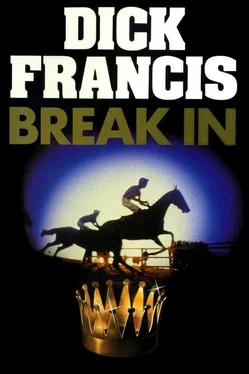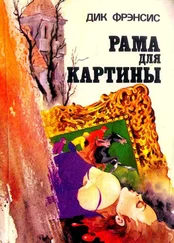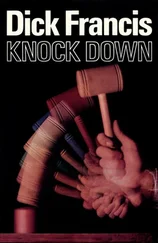‘Smells good,’ I said.
‘I was starving.’ She poured the eggs over the onions and peppers. ‘We must all be.’
We ate the omelette with hot french bread and wine and talked of nothing much until we had finished.
Then Holly, making coffee, said, ‘How did you get Jermyn Graves to go?’
‘Jermyn? Is that his name? I told him if he stopped the cheque Bobby would put him on the forfeit list.’
And don’t think I haven’t thought of it,’ Bobby said. ‘But of course it’s a dead loss from our point of view really.’
I nodded. The Jockey Club would refrain from putting an owner on the forfeit list if he (or she) paid all training fees which had been owing for three months or more. Unfortunately, though, the forfeit list leverage applied to basic training fees only, and not to vets’ or blacksmiths’ fees or to the cost of transporting horses to racemeetings. Bobby had had to pay out for all those things already for Graves’s horses, and putting the owner on the forfeit list wouldn’t get them reimbursed.
‘Why is he in such a hurry to take his horses away?’ I asked.
‘He’s just using our troubles as an excuse,’ Holly said.
Bobby nodded. ‘He’s done something like this to at least two other trainers. All young and trying to get going, like us. He runs up big bills and then one day the trainer comes home and finds the horses gone. Then Graves pays the bare training fees to avoid the forfeit list, and the trainer’s left with no horses as security and all the difficulties and expense of going to court to try to get what he’s owed, and of course it’s seldom worth it, and Graves gets away with it.’
‘Why did you accept his horses in the first place?’ I said.
‘We didn’t know about him, then,’ Holly said gloomily. ‘And we’re not exactly going to turn away people who ask us to take two horses, are we?’
‘No,’ I said.
‘Anyway,’ Holly said, ‘Jermyn’s just another blow. The worst crisis is the feed-merchant.’
‘Give him Graves’s cheque,’ I said.
Holly looked pleased but Bobby said dubiously, ‘Our accountant doesn’t like us doing that sort of thing.’
‘Yeah, but your accountant hasn’t got thirty hungry horses on his doorstep staring at him reproachfully.’
‘Twenty-nine, really,’ Holly said.
‘Twenty-seven,’ Bobby sighed, ‘when Graves’s have gone.’
‘Does that include the three unsold yearlings?’ I asked.
‘Yes.’
I rubbed my nose. Twenty-four paying inmates were basically a perfectly viable proposition, even if in his grandfather’s day there had been nearer forty. They were, moreover, just about to enter their annual rest period (as Bobby trained only on the Flat) and would no longer be incurring the higher expenses of the season.
Conversely they could not until the following March win any prize money, but then nor would they be losing any bets.
Winter, in flat-racing stables, was time for equilibrium, for holidays, for repainting, and for breaking in the yearlings, sold or not.
‘Apart from the unsold yearlings, how much do you owe?’ I asked.
I didn’t think Bobby would tell me, but after a pause, reluctantly, he did.
I winced.
‘But we can pay everything,’ Holly said. ‘At our own pace. We always do.’
Bobby nodded.
‘And it’s so unfair about the yearlings,’ my sister said passionately. ‘One of our owners told Bobby to go up to fifty thousand to get one particular yearling, and Bobby did, and now the owner’s telephoned to say he’s very sorry he can’t afford it after all; he just hasn’t got the money. And if we send it back to the next sale, we’ll make a loss. It’s always that way. People will think there’s something wrong with it.’
‘I’ll probably be able to syndicate it,’ Bobby said. ‘Sell twelve equal shares. But it takes time to do that.’
‘Well,’ I said, ‘surely the bank will give you time.’
‘The bank manager’s panic-stricken by that damned newspaper.’
‘Did someone deliver it to him too?’ I asked.
Holly said gloomily, ‘Someone did.’
I told Bobby what Lord Vaughnley had said about the Flag ’s informant being someone local with a grudge.
‘Yes, but who?’ Bobby said. ‘We really haven’t any enemies.’ He gave me a sidelong look in which humour was definitely surfacing. ‘Once upon a time it would have been a Fielding.’
‘Too true.’
‘Grandfather!’ Holly said. ‘It couldn’t be him, could it? He’s never forgiven me, but surely... he wouldn’t?’
We thought of the obstinate old curmudgeon who still trained a yardful of horses half a mile away and bellowed at his luckless lads on the Heath every morning. He was still, at eighty-two, a wiry, vigorous, cunningly intelligent plotter whose chief regret these days was that Bobby’s grandfather was no longer alive to be outsmarted.
It was true that Grandfather Fielding had been as outraged as Grandfather Allardeck by the unthinkable nuptials, but the man who brought us up had loved us in his own testy way, and I couldn’t believe he would actively try to destroy his granddaughter’s future. Not unless old age was warping him into malice, as it sadly could sometimes.
‘I’ll go and ask him,’ I said.
‘Tonight?’ Holly looked at the clock. ‘He’ll be in bed. He goes so early.’
‘In the morning.’
‘I don’t want it to be him,’ Holly said.
‘Nor do I.’
We sat over the coffee for a while, and at length I said, ‘Make a list of all the people who you know had the Flag delivered to them with that paragraph marked, and I’ll go and call on some of them tomorrow. All I can get to on a Sunday.’
‘What for?’ Bobby said. ‘They won’t change their minds. I’ve tried. They just say they want their money at once. People believe what they read in newspapers. Even when it’s all lies, they believe it.’
‘Mm,’ I said. ‘But apart from telling them again that they’ll be paid OK I’ll ask them if any of them saw the paper being delivered. Ask them what time it came. Get a picture of what actually went on.’
‘All right,’ Holly said. ‘We’ll make the list.’
‘And after that,’ I said, ‘work out who could possibly know who you deal with. Who could have written the same list. Unless, of course,’ I reflected, ‘dozens of other people who you don’t owe money to got the paper delivered to them as well.’
‘I’ve no idea,’ Holly said. ‘We never thought of that.’
‘We’ll find out tomorrow.’
Bobby yawned. ‘Scarcely slept last night,’ he said.
‘Yes. Holly told me.’
There was suddenly a loud clanging from outside, a fierce and urgent alarm, enough to reawaken all the horses, if not the dead.
‘God!’ Bobby leapt to his feet, crashing his chair over backwards. ‘He came back!’
We pelted out into the yard, all three of us, intent on catching Jermyn Graves in the act of trying to steal away his own property; and we did indeed find an extremely bewildered man holding open a stable door.
It was not, however, Jermyn Graves, but Nigel, Bobby’s ancient head-lad. He had switched on the light inside the empty box and turned his weatherbeaten face to us as he heard us approach, the light carving deep canyons in his heavy vertical wrinkles.
‘Sooty’s gone,’ he said anxiously. ‘Sooty’s gone, guv’nor. I fed him myself at half-six, and all the doors were shut and bolted when I went home.’ There was a detectable tinge of defensiveness in his voice which Bobby also heard and laid to rest.
‘I moved him,’ he said easily. ‘Sooty’s fine.’
Sooty was not the real name of Graves’s horse, but the real names of some horses tended to be hopeless mouthfuls for their attendant lads. It was hard to sound affectionate when saying (for instance) Nettleton Manor. Move over Nettleton Manor. Nettleton Manor, you old rogue, have a carrot.
Читать дальше




